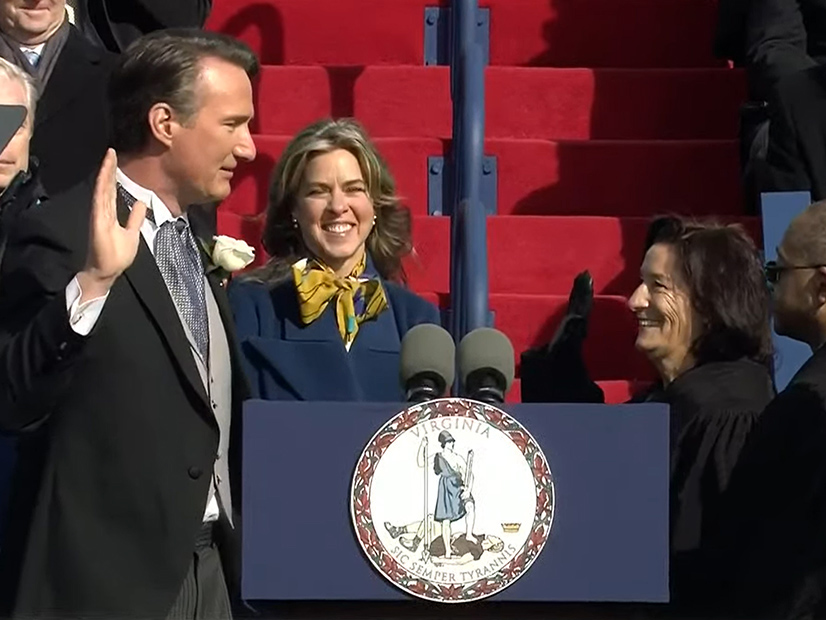
Just hours after taking office on Saturday, Virginia Gov. Glenn Youngkin (R) signed an executive order aimed at taking the state out of the Regional Greenhouse Gas Initiative, the 10-state cap-and-trade compact whose members have seen their carbon emissions decline by 50% since the program began in 2009.
The executive order sets up an expedited, 30-day process under which the departments of Environmental Quality (DEQ) and Natural Resources (DNR) will reanalyze the costs and benefits of RGGI and draft a proposed emergency regulation for the State Air Pollution Control Board to repeal its 2019 rules allowing the state to join the initiative.
Youngkin also ordered the departments to notify RGGI of the state’s intent to withdraw and “take all necessary steps so that any proposed regulation to the State Air Pollution Control Board can be immediately presented for consideration for approval for public comment.”
The order tacitly acknowledges what critics have argued since Youngkin first vowed to take Virginia out of the initiative during a speech in December: The governor does not have the authority to unilaterally order a withdrawal. (See Youngkin Vows to Pull Va. from RGGI.) He will have to work through a regulatory process that has some significant roadblocks built into it.
For example, Youngkin has based his argument against RGGI primarily on its cost to the state’s utilities and their customers. As part of its participation in RGGI, the Air Board has set a cap on carbon emissions in the state, which declines each year through 2030, and utilities must buy carbon allowances to cover emissions above the cap.
As noted in the executive order, Dominion Energy has estimated that it will have to pay $1 billion to $1.2 billion on allowances in the next four years, which has already raised residential rates $2.39/month. The utility had applied to the State Corporation Commission for an even higher add-on — $4.37/month beginning in September — to recover its costs for RGGI, but it pulled the application after Youngkin’s speech.
But how costs and benefits are calculated is sure to be a flashpoint for former EPA Administrator Andrew Wheeler and Michael Rolband, Youngkin’s picks to head the DNR and DEQ, respectively.
To date, Virginia has earned $227.6 million in proceeds from the auction of carbon allowances, as recorded on the RGGI website. That money is split between the state’s community flood preparedness program (45%) and energy efficiency measures for low-income households (50%). The remaining 5% covers administrative expenses.
In December, former Gov. Ralph Northam (D) announced that RGGI funds would provide $24.5 million to 22 local government organizations for flood preparedness projects. Another $15.2 million is filling a gap in state programs for weatherizing low-income housing, and $5.9 million is being used to preserve or build hundreds of affordable housing units, according to the Virginia Department of Housing and Community Development.
“Were Virginia to withdraw, we would lose hundreds of millions to help working-class families cut their electric bills,” said Harry Godfrey, executive director of Advanced Energy Economy Virginia.
Health benefits related to emission reductions produced by RGGI are also likely to be raised by environmental advocates. A 2020 study from Columbia University’s Mailman School of Public Health found that, in addition to carbon emissions, the initiative is cutting particulate matter, which is decreasing childhood asthma and premature birth rates. The study estimated the benefits at $191 million to $350 million across the RGGI states.
A Packed Board
Implementation of the executive order will also depend on leadership at the DNR and DEQ, which could be yet another hurdle.
Wheeler, who led EPA during the Trump administration, will first have to clear confirmation hearings in both houses of the Virginia General Assembly. Republicans now hold the House of Delegates, but Democrats have a slim majority in the Senate. (See Youngkin Taps Trump’s Former EPA Chief to Head Virginia DNR.) Similarly, because the Air Board is part of the DEQ, the less controversial Rolband might also face questions about RGGI at his confirmation hearings.
But the board itself could be the biggest obstacle to Youngkin’s effort to withdraw Virginia from RGGI, regardless of how fast he pushes for an emergency rollback. The original vote on the RGGI regulations was 5-2, and the seven-member board is now packed with Northam appointees. The new governor’s first opportunity to change the board’s composition will come in June, when Vice Chair Kajal B. Kapur’s and Gail Moore’s terms end. Youngkin might have to wait until 2024 to get a clear majority on the board.
Further, the DEQ successfully defended RGGI from a legal challenge from the Virginia Manufacturers Association. As reported in the Virginia Mercury, the Richmond Circuit Court in July rejected the association’s argument that RGGI is an illegal carbon tax on utility customers.
Virginia Democrats quickly voiced opposition to withdrawal. A statement on the state party’s Twitter feed declared that “Glenn Youngkin is already failing Virginia on climate change. His short-sighted decision to remove Virginia from the RGGI is purely partisan and it makes clear that he has no clear plan to combat climate change or invest in a clean energy future in Virginia.”
Nate Benforado, senior attorney at the Southern Environmental Law Center, called the executive order “a dead end.”
“For a new governor who has pledged to help Virginia communities struggling with climate change, this is a shocking and troubling first action out of step with what Virginia communities need,” Benforado said in an email statement.
Meanwhile, a tweet from the Richmond chapter of the Neoliberal Project noted that Del. James Morefield (R) recently introduced a bill (HB 5) that would cut the RGGI allocation for community flood preparedness from 45% to 40% and redirect that 5% to a flood relief fund that would compensate private property owners for flood damage.

